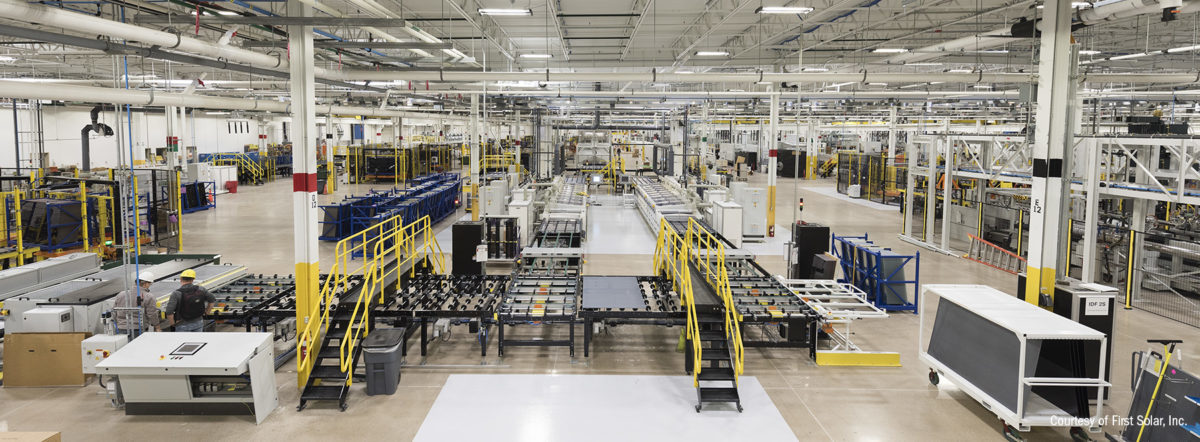When it took on retooling for its large-format Series 6 (S6) product, First Solar was in a very strong position. The company was perhaps the most profitable large solar manufacturer in the solar industry, and was sitting on more than $1.6 billion in cash.
A year and a half later First Solar is in the weeds of the transition to S6 and is seeing challenges from the difficulties of ramping new production, as well as longer-term concerns due to collapsed module prices resulting from changes in Chinese solar policy and resulting global overcapacity.
The company’s second quarter results are likely to be its low point, with revenues of only $309 million, a 50% fall from a year ago, and an operating loss of $104 million. With $40 million coming in during the second quarter from the sale of yieldco 8point3, the company reported a net loss of only $48.5 million.
First Solar is currently ramping production of S6 at both its Perrysburg, Ohio factory as well as its Malaysia factory. However, on its quarterly results call First Solar reported problems with production on the back end of the certain lines, stating that lines were not adequately buffered.
The company says that it has fixed this with adding redundancies in certain places on its lines and expects to be at the same run rate as previously predicted by the end of the year, but this has still caused a reduction in its expected 2018 production by 200 MW.
This in turn has caused delays in supplying modules to projects including the California Flats PV plant, where First Solar is installing the S6 product, and is expected to affect the timing of revenue recognition on projects.
But while there have been hiccups in terms of throughput, the S6 modules that are rolling off the line appear to be living up to expectations. First Solar reports an average capacity of 415 watts for the product – only 5 watts short of the company’s goal – and S6 has received its UL and IEC certifications.
Module prices and bookings
First Solar’s larger problem may not be manufacturing, but rather the market. In opening the call, First Solar CEO immediately referenced the “almost immediate collapse in pricing along the crystalline silicon value chain” starting in late Q2, stating that he expects more competitive PV prices and industry consolidation.
First Solar is bullish on the ability of S6 to compete even in this environment, noting the balance of systems advantage of its large format and the superior high-temperature and low-light performance of cadmium telluride versus crystalline silicon.
While the company’s bookings slowed to 900 MW during Q2, First Solar reports 400 MW of bookings in July already, which is a strong start to Q3. The company also reported success with its development business, including acquiring a portfolio of new projects in the Southeastern United States.

With 10.9 GW of current bookings, First Solar estimates that it is 80% booked through the end of 2020, which provides a degree of security for its ongoing expansion.
And First Solar has not stopped growing. Six weeks ago the company broke ground on a new 1.2 GW factory in Ohio, and in addition to its existing Ohio and Malaysia factories is outfitting twin 1.2 GW factories in Vietnam, the first of which is expected to produce its first S6 modules at the end of Q3.
Backing this up is one of the largest war chests of any PV maker, with over $3 billion in cash and marketable securities. So while First Solar may face headwinds from falling module prices, CEO Mark Widmar’s statement that “we have never been better positioned to weather the current near-term challenges” is not hyperbole.
This content is protected by copyright and may not be reused. If you want to cooperate with us and would like to reuse some of our content, please contact: editors@pv-magazine.com.



By submitting this form you agree to pv magazine using your data for the purposes of publishing your comment.
Your personal data will only be disclosed or otherwise transmitted to third parties for the purposes of spam filtering or if this is necessary for technical maintenance of the website. Any other transfer to third parties will not take place unless this is justified on the basis of applicable data protection regulations or if pv magazine is legally obliged to do so.
You may revoke this consent at any time with effect for the future, in which case your personal data will be deleted immediately. Otherwise, your data will be deleted if pv magazine has processed your request or the purpose of data storage is fulfilled.
Further information on data privacy can be found in our Data Protection Policy.